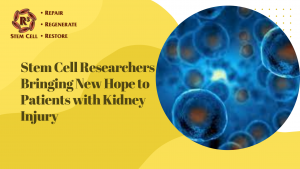Naples, Florida Oct 2, 2022 (Issuewire.com) - Here we are with another breakthrough in regenerative medicine!
As per the latest report, Scientists have reported promising results in the early stages of a clinical trial for treating people with acute kidney disease.
The study shows how mesenchymal stromal cells (MSCs) are delivered using SBI-101, a new ex vivo drug delivery system that can keep MSCs reprogrammed and viable longer and the peripheral immune response toward organ repair.
Before moving forward little overview, Acute kidney disease concerns blood filtration. When suddenly the kidney is not able to perform the filtration of blood, it leads to the accumulation of dangerous levels of waste. In more severe cases, the patient either requires dialysis or a kidney transplant. Unluckily, in dialysis-dependent acute kidney injury, the mortality rate is 50 to 70 percent.
The main reason behind Inflammation is critical illnesses; during inflammation, mediators become dysregulated, which drives a “cytokine storm.” This leads to an immunity vicious cycle that further severely affects or damages kidneys and other organs.
Currently, treatments fail to broadly address these underlying inflammatory processes.
“Getting ahead by involving mesenchymal stromal cells in treating SBI-101 for kidney disease will surely help reprogram the peripheral immune response toward affected organ repair. In addition, the treatment's healing potential in clinical trials is surely a ray of hope for patients with high mortality rates,” said Dr. David Greene, r3 stem cell founder.
Mesenchymal Stromal Cells contain various types of molecules that regulate the response of immune cells to inflammation. This is the reason it holds great potential for use in regenerative medicine. And this has led to the search for a more efficient method of delivering MSCs.
So, here comes the innovation of SBI-101 therapy, a combination MSCs, and a blood filtration device approved by the FDA to control and improve exposure to MSCs. A device housing MSCs that allows a patient's blood to be reprogrammed outside the body, thereby maintaining their viability for the treatment duration.
During Phase 1, clinical trials were designed to test the tolerability, safety, and pharmacology of SBI-101 in adults with life-threatening kidney failure who were already receiving dialysis.
Researchers enlisted sixteen patients for the study.
Twelve were treated with SBI-101 and their standard CCRT regimen, while four received a sham SBI-101 along with Continuous Renal Replacement Therapy. The treatment period lasted for at least 12 and up to 24 hours.
Over a 28-day period after treatment, assessments were then taken.
In assessments, researchers showed that MSCs were viable for the 24-hour dose measured by secreted factor levels, verifying a longer duration of therapy. In addition, it is seen that SBI-101 encouraged an immunotherapeutic response that decreases kidney injury by evaluating surrogate biomarkers. And it is seen that there are no serious adverse effects related to SBI-101 were seen.
At last, breakthroughs in regenerative medicines like these will surely open the gate for a lot of patients going through serious or non-curable problems.
Thanks to the researchers working hard to discover treatments that bring advancements in the medical field.
Media Contact
Dr David Greene r3 Stem Cell *****@gmail.com 02392638444 1112 Goodlette Road North, Suite 203 https://filmfreeway.com/DrDavidGreener3StemCell









